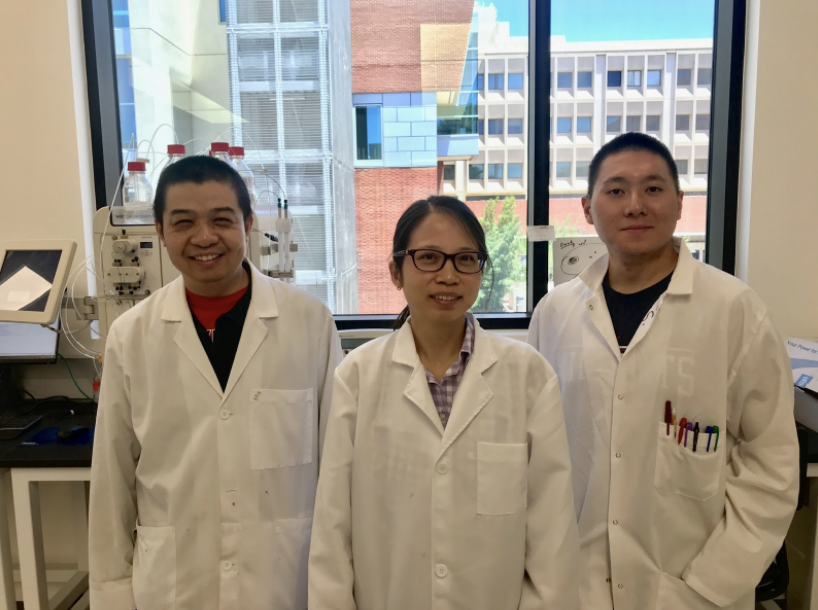As confirmed COVID-19 cases quickly approach 7.4 million, a group of University of Arizona researchers is giving the public something to be optimistic about.
Dr. Jun Wang, an assistant professor in the UA’s College of Pharmacy’s Department of Pharmacology and Toxicology, along with his lab team — Chunlong Ma, Yanmei Hu and undergraduate student Tommy Szeto — have identified compounds that block the viral replication of SARS-CoV-2, the pathogen responsible for causing COVID-19.
Through thorough research and testing, the team has identified four compounds that could block the replication of SARS-CoV-2 within a cell. This means that these compounds could be used as vaccines or antiviral agents that could help people heal from the sometimes fatal virus.
RELATED: Arizona sees record-high increase in number of COVID-19 cases
Wang’s team began using their relevant expertise in respiratory viruses and antivirus responses to study the catastrophic pandemic back in late January. Since then, they have been studying relationships between viral proteins capable of fostering SARS-CoV-2 and corresponding antiviral compounds.
“When viruses infect the cell, they will begin to produce a number of viral proteins, and those viral proteins will help the replication of the viruses,” Wang said. “We must identify the protein most critical to support the viral replication, and the next step is to find a molecule that can interfere with the replication of that protein.”
The team identified the SARS-CoV-2 “main protease” as the protein critical for viral replication through reviewing coronavirus literature. Then, after a tedious process, they were able to identify four compounds capable of intercepting the protein. The compounds they identified are boceprevir, GC-376 and calpain inhibitors II and XII.
Testing of these compounds and their impacts on viral replication of the main protease within cells was promising for Wang and his team. They tested the compounds by infecting the cells with SARS-CoV-2 and observing the reactions that took place when adding the compounds into the mix.
“To put it simply, we infected cells with SARS-CoV-2 and without any treatment, all of the infected cells would die,” Wang explained. “We added these four compounds to this viral infected cell culture, and with the treatment from our four compounds all the cells survived, which means that the virus cannot replicate in the presence of our drugs.”
Szeto, an undergraduate researcher a part of Wang’s lab team, whose work focuses on producing proteins from the coronavirus, describes the aim of this groundbreaking research.
“We hope that if our research effort produces an effective antiviral then we can begin to produce the pharmaceutical(s) on a large scale quantity and distribute to the world,” Szeto said in an email.
Despite the success of proving that the four compounds can stop the replication of SARS-CoV-2, Wang stresses the importance of the public continuing to adhere to COVID-19 guidelines. Boceprevir is the only one of the compounds that has been tested in humans before, as it is currently used to treat hepatitis C, and because of this, Wang emphasizes that there is a very long process of testing before all of the compounds will become approved to reach the public, so continuing to stay cautious and social distance is a must.
RELATED: Amidst a global pandemic, child development affected in many different forms
“If more people try to take care of themselves and the people around them, it is going to help us tremendously because it will buy us more time to develop vaccines and the antivirals,” explained Wang. “If we flatten the curve, then people like us, all the doctors, we still have the capacity to deal with this problem.”
Nevertheless, Wang and his lab members are highly confident that the identified compounds could be a breakthrough in public health and a remedy for the global pandemic.
“I think that we will overcome this COVID-19 in the near future,” said Ma, a research specialist in the College of Pharmacy and a member of Wang’s lab team.
The team strives to bring a level of optimism to the public. In these harsh times, the light of hope shines through for Wang and his research team, working day-in and day-out to make a difference in public health.
“I know these times are uncertain and difficult for us all, but this work gives me hope that one day this pandemic will only be talked about as a distant memory,” Szeto said in an email.
Wang explains, “I want to give them confidence, it will only be a matter of time before we win the war against COVID-19.”
Many UA doctors, faculty and students are playing a part in trying to further COVID-19 research.
From the UA Water and Energy Sustainable Technology Center tracking the virus through wastewater to the Department of Immunology working on antibody detection methods to Wang and his team coming up with antiviral solutions, many are working to alleviate suffering from this global pandemic.
Follow Quinn McVeigh on Twitter









